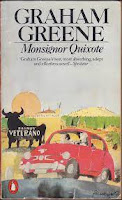Like a metronome, Graham Green's oeuvre oscillates between two points: mainstream and literary fiction. The metaphor appropriate, the majority of the time the needle is traveling. It spends little time at either extreme, meaning much of Greene's more entertaining fiction can be explored and his more literary work offers elements of pure enjoyment. Monsignor Quixote (1979), one of Greene's last novels, is a droll yet idealistic mix that finds the needle floating free and easy somewhere close to the center.
Crammed into as few words as possible, Monsignor Quixote is a mini-retelling of Cervantes' masterpiece, set in the modern era, and all delicate humor intact. A cogent pastiche, Greene starts the novel in El Toboso, Spain where a local priest, one Father Quixote, has a chance encounter with a bishop from the Vatican. Awarded the title of 'Monsignor' in the aftermath, Quixote is quite thrown by the new title, and elects to go on a road trip with the recently deposed mayor of El Toboso to try and get his head around it. The mayor, named Sancho, is a communist who loves wine as much as Quixote, something the pair consume in vast quantities driving in Quixote's small Seat 600, a car he dubs Rocinante. Taking an overland journey through Spain together, the pair wrestle with the big ideas of religion and politics. But for every bottle they go through, the truth becomes a little grayer.
If ever there was a doubt Greene is a master writer, Monsignor Quixote is proof. In two-hundred and fifty pages he captures the subtle tones and scenes of Cervantes, while applying an intelligent, modern take on religion and politics in the offing. Quixote and Sancho banter about Catholic traditions and the values of communism, but always in an offhand manner. It's a layman's dialogue that never dips into pedagogy or authorial navel-gazing. Instead, it's the characters, their journey, and the various peculiar encounters they have on the road which are the novel's fuel. Combined, the whole makes for intellectually playful story for the engaged mind to laugh at and turn over. Few writers nail this overlap of humor, ideology, and human nature so well. So, a priest and a communist walk into a bar...
Like Don Quixote the original, Monsignor Quixote is more episodic than overarching. But Greene certainly infuses a sense of coherency to his novel as each of his two leading men looks to justify his beliefs through the strange but real scenarios the roadtrip throws their way. This will not be a popular opinion, but there is something to be said for the concision of Greene's offering. Scholars of Cervantes' will undoubtedly want to crucify me, but the brevity of Monsignor is something to be desired compared to the work on which it is based, humor intact.
In the end, Monsignor Quixote is a most subtle picaresque best enjoyed by readers for whom the major conceptions of world culture (literature, politics, religion, etc.) are enhanced by a bottle or four of house red. While Franco's regime in Spain is long in the rearviewmirror, the ideas of communism live on, just as Catholicism persists. Readers need not have spent countless hours pushing through Don Quixote to enjoy Monsignor. In fact, Monsignor makes for a more coherent, effective read for the manner in which Greene does not overstay his book's welcome, sacrificing little of the ideological interplay and humor of his characters and scenes along the way. The comedic elements not to be understated, it's one of those books which will have the reader bubbling warmly inside every chapter and turning the last page with a bittersweet smile.


No comments:
Post a Comment